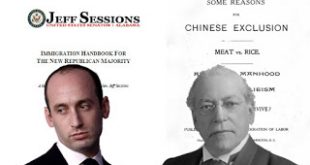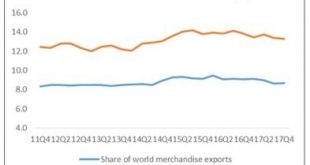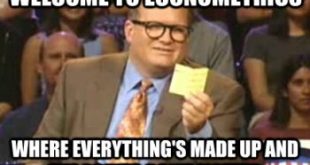(Dan here…From Esquire comes this note from the Boston Globe): We begin with good news up here in the Commonwealth (God save it!), where Attorney General Maura Healey, who does not punch down, has opened hostilities against the pharmaceutical companies that have raked in the profits from the opioid crisis. From The Boston Globe: She asserts that the privately held company and 16 of its key directors and executives actively obfuscated the truth about...
Read More »How to be a great economist
from Lars Syll The master-economist must possess a rare combination of gifts … He must be mathematician, historian, statesman, philosopher—in some degree. He must understand symbols and speak in words. He must contemplate the particular, in terms of the general, and touch abstract and concrete in the same flight of thought. He must study the present in the light of the past for the purposes of the future. No part of man’s nature or his institutions must be entirely outside his regard....
Read More »Goebbels or Gompers Addendum
In my original post, I didn’t say much about the overt racist expression in Gomper and the A. F. of L.’s advocacy for Chinese exclusion. I guess that is because I read the stuff voluminously a couple of decades ago and it by now it just seemed to me it was common knowledge. Of course it isn’t. I was astonished and appalled when I first read it. Not so much at the vileness as at the obsessive repetition of that vileness. The pamphlet, Some Reasons for...
Read More »Statistics and econometrics are not very helpful for understanding economies
from Lars Syll A statistician may have done the programming, but when you press a button on a computer keyboard and ask the computer to find some good patterns, better get clear a sad fact: computers do not think. They do exactly what the programmer told them to do and nothing more. They look for the patterns that we tell them to look for, those and nothing more. When we turn to the computer for advice, we are only talking to ourselves … Mathematical analysis works great to decide which...
Read More »Goebbels or Gompers?: A Closer Look at Stephen Miller’s Immigration Manifesto
Stephen Miller, architect of the Trump administration’s immigration policy is getting a lot of bad press these days. Some wags (and even relatives?) juxtapose Miller’s photo to one of Nazi propagandist Joseph Goebbels, insinuating likeness of facial expression is a predictor of ideological leaning and propaganda technique. The comparison is as unhelpful as it is unfair. A more apt comparison would be with Samuel Gompers, founding president of the American...
Read More »Book this!
from David Ruccio The premise and promise of the Republican tax cuts—officially, the Tax Cuts and Jobs Act—are that lower corporate taxes would lead to increased investment and thus more jobs and higher wages for American workers. We all knew at the time that the logic was a sham. As I explained last August, one of the likely outcomes of the kind of corporate tax cuts Donald Trump and his fellow Republicans supported—and, as we saw, eventually rammed through—would be an increase in...
Read More »Has Donald Trump already changed US trade?
from C.P. Chandrasekhar and Jayati Ghosh There is no doubt that President Trump is upending global trade. He has unleashed a trade war with China as well as with some of the US’ s purported allies, using grounds of “threats to national security” to impose tariffs on many US imports. The likely retaliation will obviously affect some US exports in turn. The trajectory of world trade suddenly looks quite uncertain – and this will also depress investment across the trading world. So the Trump...
Read More »Open thread June 22, 2018
Econometric inconsistencies
from Lars Syll In plain terms, it is evident that if what is really the same factor is appearing in several places under various disguises, a free choice of regression coefficients can lead to strange results. It becomes like those puzzles for children where you write down your age, multiply, add this and that, subtract something else, and eventually end up with the number of the Beast in Revelation. Prof. Tinbergen explains that, generally speaking, he assumes that the correlations under...
Read More »When both men and women drop out of the labor force, why do economists only ask about men?
from Dean Baker That’s what New York Times readers were wondering when they saw Harvard Economics Professor Greg Mankiw’s column, “Why Aren’t Men Working?” The piece notes the falloff in labor force participation among prime-age men (ages 25 to 54) for the last 70 years and throws out a few possible explanations. We’ll get to the explanations in a moment, but the biggest problem with explaining the drop in labor force participation among men as a problem with men is that since 2000, there...
Read More » Heterodox
Heterodox






